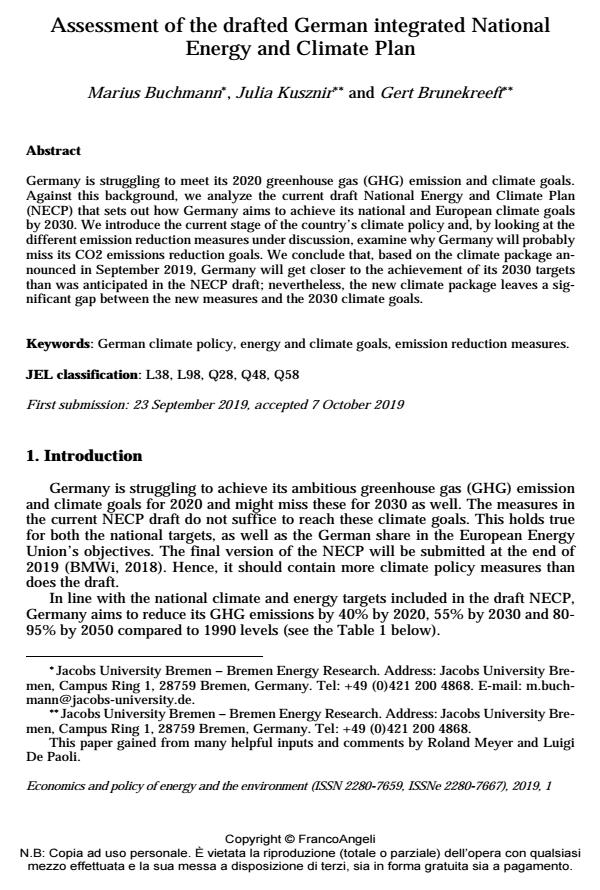Assessment of the drafted German integrated National Energy and Climate Plan
Titolo Rivista ECONOMICS AND POLICY OF ENERGY AND THE ENVIRONMENT
Autori/Curatori Marius Buchmann , Julia Kusznir , Gert Brunekreeft
Anno di pubblicazione 2019 Fascicolo 2019/1
Lingua Inglese Numero pagine 12 P. 85-96 Dimensione file 98 KB
DOI 10.3280/EFE2019-001006
Il DOI è il codice a barre della proprietà intellettuale: per saperne di più
clicca qui
Qui sotto puoi vedere in anteprima la prima pagina di questo articolo.
Se questo articolo ti interessa, lo puoi acquistare (e scaricare in formato pdf) seguendo le facili indicazioni per acquistare il download credit. Acquista Download Credits per scaricare questo Articolo in formato PDF

FrancoAngeli è membro della Publishers International Linking Association, Inc (PILA), associazione indipendente e non profit per facilitare (attraverso i servizi tecnologici implementati da CrossRef.org) l’accesso degli studiosi ai contenuti digitali nelle pubblicazioni professionali e scientifiche.
Germany is struggling to meet its 2020 greenhouse gas (GHG) emission and climate goals. Against this background, we analyze the current draft National Energy and Climate Plan (NECP) that sets out how Germany aims to achieve its national and European climate goals by 2030. We introduce the current stage of the country’s climate policy and, by looking at the different emission reduction measures under discussion, examine why Germany will probably miss its CO2 emissions reduction goals. We conclude that, based on the climate package announced in September 2019, Germany will get closer to the achievement of its 2030 targets than was anticipated in the NECP draft; nevertheless, the new climate package leaves a significant gap between the new measures and the 2030 climate goals.
Parole chiave:German climate policy, energy and climate goals, emission reduction measures.
Jel codes:L38, L98, Q28, Q48, Q58
- Impact of Key Drivers on Energy Intensity and GHG Emissions in Manufacturing in the Baltic States Vaclovas Miskinis, Arvydas Galinis, Viktorija Bobinaite, Inga Konstantinaviciute, Eimantas Neniskis, in Sustainability /2023 pp.3330
DOI: 10.3390/su15043330 - European Roadmaps to Achieving 2030 Renewable Energy Targets Giacomo Di Foggia, Massimo Beccarello, in SSRN Electronic Journal /2024
DOI: 10.2139/ssrn.4770915 - A Global Perspective on Renewable Energy Implementation: Commitment Requires Action Giacomo Di Foggia, Massimo Beccarello, Bakary Jammeh, in Energies /2024 pp.5058
DOI: 10.3390/en17205058 - European roadmaps to achieving 2030 renewable energy targets Giacomo Di Foggia, Massimo Beccarello, in Utilities Policy 101729/2024 pp.101729
DOI: 10.1016/j.jup.2024.101729 - Review of Energy and Climate Plans of Baltic States: The Contribution of Renewables for Energy Production in Households Dalia Streimikiene, Grigorios L. Kyriakopoulos, Gintare Stankuniene, in Energies /2022 pp.7728
DOI: 10.3390/en15207728
Marius Buchmann , Julia Kusznir , Gert Brunekreeft, Assessment of the drafted German integrated National Energy and Climate Plan in "ECONOMICS AND POLICY OF ENERGY AND THE ENVIRONMENT" 1/2019, pp 85-96, DOI: 10.3280/EFE2019-001006